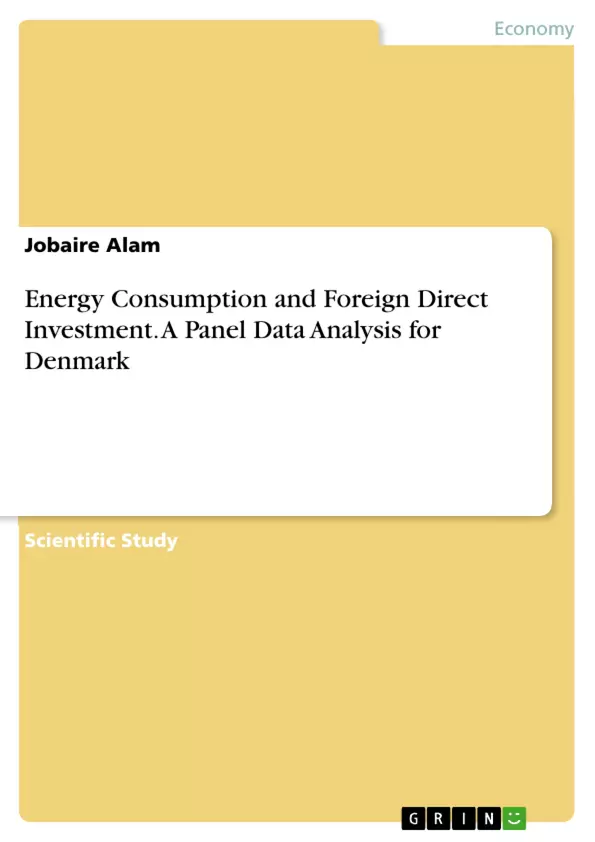This study consists of a measurement of the relationship between Foreign Direct Investment (FDI) and energy consumption in Denmark. Panel data will be analyzed for the period of last 20 years. Theoretical arguments of energy consumption, its association with the FDI and the determinants of FDI will be presented in the literature review section. Researcher is proposing quantitative method with factor analysis for large dataset and regression analysis to understand the relationship between the variables. Results are expected to demonstrate that Danish economy follows the path of developed countries, which validates the hypothesis of previous studies.
Keywords: Energy consumption, Foreign Direct Investment, Panel data.
Inhaltsverzeichnis (Table of Contents)
- Introduction & Background
- Purpose and objectives
- Research Questions
- Literature Review
- Environmental Kuznets Curve (EKC)
- Carbon dioxide emissions
- Energy Consumption and Economic Growth
- Methodology
- Method
- Empirical data collection
- Factor analysis and regression analysis
- Definitions
- Expected results
Zielsetzung und Themenschwerpunkte (Objectives and Key Themes)
This study aims to investigate the relationship between energy consumption and foreign direct investment (FDI) in Denmark from 1995 to 2015. It seeks to determine the impact of FDI on Danish energy consumption and explore the cultural, social, and political effects of FDI on the Danish economy.
- The relationship between energy consumption and FDI
- The impact of FDI on energy consumption in Denmark
- The influence of globalization on FDI in Denmark
- The role of the Environmental Kuznets Curve (EKC) in understanding the relationship between energy consumption and economic growth
- The determinants of FDI in Denmark
Zusammenfassung der Kapitel (Chapter Summaries)
The introduction presents the research topic, focusing on the connection between energy consumption and FDI in Denmark. It highlights the use of panel data and unit root tests in the study. The "Purpose and objectives" section clarifies the research goals, including evaluating the impact of FDI on energy consumption and examining globalization's role in attracting FDI. The "Literature Review" explores various theoretical arguments and empirical findings related to energy consumption, FDI, the EKC, and carbon dioxide emissions. It highlights contrasting perspectives on the relationship between FDI and energy consumption. The "Methodology" section outlines the quantitative approach, including the use of factor analysis and regression analysis on a large dataset. It details the four equations to be formulated and the data sources used. The "Expected results" section provides insights into anticipated findings, particularly regarding the relationship between energy consumption and FDI, the impact of globalization on FDI, and the role of the EKC model in understanding the relationship between energy consumption and economic growth.
Schlüsselwörter (Keywords)
The research focuses on energy consumption, foreign direct investment (FDI), panel data analysis, the Environmental Kuznets Curve (EKC), globalization, economic growth, and Denmark. It explores the relationship between these concepts, examining the influence of FDI on energy consumption and the broader implications for the Danish economy.
Frequently Asked Questions
What is the focus of the study on Denmark's economy?
The study investigates the relationship between Foreign Direct Investment (FDI) and energy consumption in Denmark over a 20-year period (1995-2015).
What is the Environmental Kuznets Curve (EKC)?
The EKC is a theoretical model used to understand the relationship between economic growth and environmental degradation, suggesting that environmental impact increases then decreases as an economy develops.
Which methodology is used in this research?
The researcher uses a quantitative method involving panel data analysis, factor analysis for large datasets, and regression analysis.
Does FDI increase energy consumption in Denmark?
The study aims to determine the specific impact of FDI on Danish energy consumption, exploring whether it follows the typical path of developed countries.
What are the key themes of the literature review?
The literature review focuses on carbon dioxide emissions, the link between energy consumption and economic growth, and the determinants of foreign investment.
- Quote paper
- Jobaire Alam (Author), 2015, Energy Consumption and Foreign Direct Investment. A Panel Data Analysis for Denmark, Munich, GRIN Verlag, https://www.grin.com/document/413348



